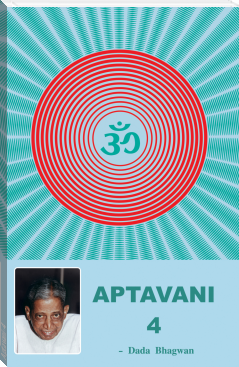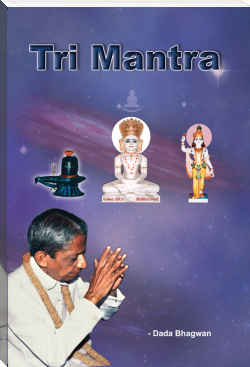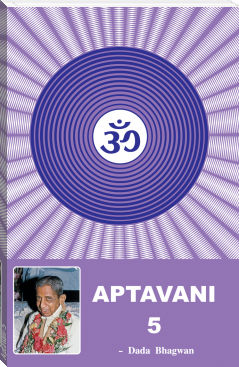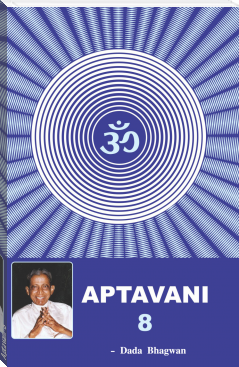Aptavani-4 - Dada Bhagwan (snow like ashes series .txt) 📗

- Author: Dada Bhagwan
Book online «Aptavani-4 - Dada Bhagwan (snow like ashes series .txt) 📗». Author Dada Bhagwan
That which the world commonly refers to as awareness; the Gnani calls ‘sleep’. That, which is perceived as the ‘seer’, is only the ‘scene’. The one who has the awareness that, ‘I am aware’ is only the inanimate (non-Self) part. The Self is completely separate from that.
There is such intense experience of oneness of the ‘relative’ and the ‘real’, that up to ninety-nine percent (almost towards the end), the two run parallel, in which the original ‘real’ mirrors the illusory ‘relative.’ Their proximity to each other manifests as one, until the time when the two are separated at the final link. The secret of all of this is disclosed only by the ‘Gnani Purush’, who himself has had the experience. Only then, one experiences the great difference between the illusory awareness (bhrant jagruti), and the awareness of the pure Soul (Atma jagruti ).
For a long time, for the purpose of clarification, attempts have been made to differentiate between destiny (prarabdha), and independent effort or free will (purusharth). The difference has already been told by the experienced ‘Gnanis.’ But because of the prevalence of the indirect knowledge, its proper understanding has virtually become fragmented. Commonly, the awareness of ‘doership’ attempts to attain that ‘doership’, and the results of those attempts, is believed to be independent effort or free will (purusharth). In the Gnani’s vision, all of that is completely destiny (prarabdha).
Anything that is experienced through the five senses and the mind is all destinies (prarabdha). The independent effort (purusharth) part is subtle, and it is difficult to fathom. The independent effort of human beings is illusory. Time cycles of cause and effect remain in motion, uninterrupted, on account of that illusory independent effort of human beings. When the right independent effort(purusharth) is done, this comes to an end. The right independent effort is possible only after one has become the Self(Purush). This happens after Self-realization. Right independent effort is continual (akhand), unending(avirata), and non-dependent(niralumb). A perpetual state of liberation prevails through the alertness of this effort.
In the universe, there is no shortage of things. However, they are not attained, because of the obstruction created by one’s own ‘self’. The secret of these hindrances, and all the hidden keys that help one to remain aware about them, have been simply and effortlessly clarified by the manifest ‘ Gnani Purush.’
What is karma? What is it that binds one with karma? What gives person liberation from karma? Who is the mother of karma? Who is the father? These and other deeper questions are very difficult to resolve. The scriptures have told us everything, but it is like instruction with a pointing of finger. Because of change in vision, when the indication is towards North, it is perceived as South, so that the person proceeds in that direction. How then can one reach one’s destination? Even the scriptures are not capable of explaining the meaning. Only the Gnani Purush can give you this. The revered Dadashri has explained a very intricate and profound subject like karma, in a simple and easy way.
By saying for the first time that, speech is a ‘taped record’, Dadashri has fractured all ownership of speech. How does this ‘record’ play? How is this ‘record’ made? What are the results when it is played? He has revealed these, and other deepest of the deep secrets. With a very simple explanation he elucidates the entire complex science behind speech!
The underlying mysteries of many similar subjects have been exposed. Attempts are made to publish as many of them as possible. It is hoped that for those who are ‘positive’, life-oriented thinkers, philosophers, ‘seekers’, and those who desire liberation, this Aptavani (authentic speech of the Gnani Purush) will impart moment to moment awareness.
In an attempt to convert the direct speech that has emanated from the very mouth of the auspicious Gnani Purush, into this indirect presentation, we sincerely ask for forgiveness for any errors made in its contents.
- Dr. Niruben Amin
INTRODUCTION
[1] Awakened Awareness
One is the Atma (Self) and is capable of illuminating the entire universe. As the Self, one has infinite energy (anant shakti). Even so, all the helplessness, suffering, pain and insecurity are experienced by the ‘self’. How unusual is this! What is the reason for it? It is because, one is not aware of the Self (swaroop), One’s own energy (shakti;power), and the realm (satta) of the Self. Once the Self becomes awakened (jagrut), there prevails the bliss of the ‘Owner’ of the entire universe.
The whole world is entrapped in asleep to the Self(bhaavnindra). The lack of awareness, as to what is beneficial and what is harmful in this world, and in the world hereafter: anger, pride, deceit, greed; disputes, and worries, are all perpetuated because of the prevailing bhaavnindra. Whereas the whole world is preoccupied with the pleasures of the non-Self complex(pudgal), the Gnani is in the state of the awareness of the Self, and in the bliss of the Self (Atma-ramanata). Perfect awareness is the absolute knowledge(Kevalgnan), when the awareness reaches one hundred percent, absolute knowledge arises.
Awareness (jagruti) is truly the mother of liberation (moksha). As the awareness about the worldly life increases, one realizes its meaningless futility. Ultimately this results in the highest dispassion towards all worldly pleasures(vairagya). And the one who has reached the height of awareness of the knowledge of the senses, is not divisive as a result of differences of opinions with anyone, but is ‘everywhere adjustable.’
However, the birth of anger, pride, deceit, greed (kashays–inner enemies) only occurs in the absence of awareness. The one who has no awareness of kashays is very much in an ignorant state. The one, who is aware of them, is slightly alert. And the one who ‘washes’ them off after they occur through repentance (pratikraman) is awake and alert(jagrut). And the one who is exceptionally alert will turn the kashays around even before they occur. Furthermore, the one who ‘fuels’ the kashays is terribly ignorant.
The vision that sees one’s own faults is the measure of awareness. The vision that sees faults of others shrouds one’s awareness with serious ‘veils’ (coverings). The Gnani sits on the summit of awareness. His subtler (sookshmatar) and subtlest (sookshmatam) mistakes, hurt no one; he sees them in Gnan and he ‘washes’ them away. He is faultless(nirdosh) and he sees the world as being faultless – this is called the state of awareness. The highest awareness is that while conversing with someone, he has the continuous awareness (laksha) that the other person is pure Soul(Shuddhatma).
In the Kramic path, the traditional step-by-step path to Self-realization, the awareness of the intention (bhaav jagruti, ‘cause’ karma) is considered the best of all; whereas in the path of Akram Vignan, the current, unique, non-sequential and direct path to Self-realization, the Self-awareness which is beyond intent or non-intent (bhaav-abhaav), is easily gained by the grace of the Gnani! The constant presence of the complete knowledge in the form of Gnata (the ‘Knower’) and the gneya (object to be known) is called complete awareness! To ceaselessly remain in the special directives(Agnas) of the Gnani Purush is considered a high level of awareness! The application of seeing pure Soul in every living being is also a high level of awareness.
Initially, the awareness arises in the worldly interactions(vyavahar). After that, one ‘sleeps’ in the worldly interactions and awakens to the awareness of the Self (nischay). When there is no conflict anywhere, when there is no dissension as a result of differing opinion, one is said to be in the awareness of the worldly interactions(vyavahar). In this awareness, there are many kashays;whereas in the awareness of the Self (nischay), these kashays (anger, pride, deceit and greed) have become rootless! Being aware of each and every act of the antahkaran (the inner complex of the self comprised of mind, intellect, chit and ego), is the true awareness.
In the early stages of awareness, nobody suffers at any time because of us. Subsequently, we have no suffering at any time, because of others. In the stages of awareness, there is natural oneness with the pure Soul.
The awareness of awakening Kundalini (yogic power; corporeal energy) or traditional methods of meditation do not help increase awareness, but they do increase the ego. ‘Meditation’ is a form of intoxication primarily for the ego (maadakata). There is a possibility for awareness to flourish during a situation of internal ‘burning’ (due to kashays), but the intoxication of ‘meditation’, covers the awareness with ashes.
It is possible to attain the awareness needed for liberation through the worship of the Souls with the awareness; beginning with the one who has just attained the Self, and going all the way up to the one who has reached the state of absolute knowledge (Kevalgnan). Through theGnani’s grace, one can make a connection with the current living Tirthankar – Shree Simandhar Swami, who dwells in MahavidehKshetra .He has Absolute Awareness and He is a vital instrument for our liberation(moksha). Through His continuous worship, it is possible for us to go there from here, and reside at His lotus feet (in the next life), and thereafter, attain liberation (moksha).
In the mundane worldly matters, where the world is awake; the Gnanis are ‘asleep’, and in spiritual matters, where the world is ‘asleep’, the Gnanis are awake! The worldly awareness is with the ego; whereas with awareness without the ego, there is liberation (moksha)!
[2] Dhyan (Meditation)
What is meditation (dhyan)? Meditation is not something that one has to ‘do’. Meditation (dhyan) happens naturally. Meditation is a result. What the world calls meditation, is not meditation(dhyan), but it is concentration(ekagrata).
Vitarags (the fully enlightened beings who have no attachment or abhorrence), have described four types of meditation: When someone insults you, and you experience wrath at that time, the resulting anger is called raudradhyan (adverse internal meditation that hurts the self and others), and the effect of this result will hurt the ‘self’ and will reach others! However, if it affects only you and no one else, then it is artadhyan (adverse internal meditation that hurts the self). Artadhyan also comprises worries such as, “What will become of me?” and worries about the future, etc.
In events that cause an effect on us, when a person regards them as: “This is the manifestation of the unfolding of my own karma. The other person is simply instrumental (nimit) in it; he is faultless(nirdosh)”; when such a state results within, it is called dharmadhyan (virtuous meditation; absence of artadhyan or raudradhyan). If it remains in one’s awareness (laksha) that, “I am pure Soul( Shuddhatma)”, and others are seen as pure Soul, then that is called shukladhyan (meditation as the Self).
Once the goal (dhyeya) is decided and one becomes the dhyata (one who meditates on the goal) and when the two (dhyeya and dhyata) make a connection, then meditation(dhyan) at the time, is simultaneous and occurs naturally. The ego is present when the goal (dhyeya) is being decided, but it is absent during meditation. There is ego in doing actions, but not in meditation. Doing actions is not meditation, but that which results from the act of doing is meditation, and here, the ego is absent. Meditation (dhyan) is not ‘done’ (it cannot be ‘done’); it happens (naturally). Artadhyan





Comments (0)